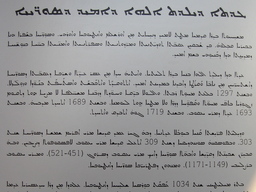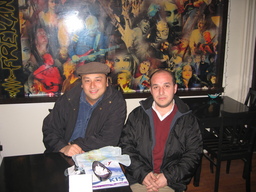
Syriac Script
 Syriac Script |
It's approaching midnight on New Year's Eve. I know that any of the several people I've met over the past few days would be happy to meet up and take me out around Diyarbakir. I've elected to stay in the whole day, though. I've walked around the city walls; explored the old city of Diyarbakir with its mosques, churches, and minarets; and taken evenings out with locals I met--going non-stop over the past couple days. It's time for a day off. Above anything else, I feel like relaxing and getting up to date with my website.
It won't be hard to be right in the thick of the things when it strikes midnight. I'm staying at the Aslan Hotel, a decent place across from one of the main plazas, right along the north wall. My balcony overlooks the clock tower in the center of the square, separated by a narrow road. I'm so close that I'm certain I could hurl something from my balcony and hit the clock face, if I had aim good enough.
Earlier today I watched workers preparing for whatever is to come. The clock tower is already surrounded by flashing colored lights, klieg lights, and dozens of speakers that seem primed for some kind of noise-making. There are a few hours yet until the new year. I'll likely venture out around midnight to see what's happening.
I have made a New Year's resolution. I've started making these more and more in recent years, and do tend to carry them out. My resolution at the beginning of 2003 was to quit my job and be away from the U.S. for at least one year, spending most of that time in Kashgar. A couple years ago it was to wake up by a certain hour every day. This year's resolution is easy in principle, but it's one of those things I don't think I'd get around to otherwise. I've resolved that over 2008 I will contact--at least once--everybody for whom I have contact information. I have so many separate e-mail addresses, street addresses, telephone numbers, and mobile numbers scattered electronically or on paper. It feels right that I should be in touch at least once a year with anybody whom I care enough about to have held onto their contact information.
I'm sure I'll find names of people whose information it may be time to delete, either because it's outdated, or because any sort of relationship is no longer desired by one party or the other. I suppose to fulfill my resolution it would be easy enough to send a massive spam to everybody in my e-mail address book. I want this to be more about renewal of personal relationships than about just updating my address book, though.
Yesterday, I met two of the most interesting people I've encountered on this trip. Murat, is one of the last Armenians living in Diyarbakir. He said that his family finally packed up and moved off to Istanbul ten years ago. Other than Murat there is only one elderly couple, minding the shuttered Armenian church. I found Murat interesting not just for being a member of an ethnicity which I thought was completely wiped out from this area ninety years ago, but also his occupation: he translates between Turkish and Kurdish for the U.N. in northern Iraq. We spent yesterday evening together over dinner and tea, both of which he insisted on paying for.
 David and Murat at Teahouse |
What fascinated me even more than the spoken language (which sounds a lot like Arabic to me) was the script. There are different ways Aramaic has been written, what Yusuf's church uses is the Syriac script. It looks a lot like Arabic, so much so that I thought it was a really nice style of Islamic calligraphy I was unfamiliar with when I first saw it. Superficial resemblance aside, Syriac uses a completely different alphabet than Arabic is written in.
I've fairly well decided that I will not take that detour into Syria I contemplated in my last update. I need to make it to Europe in under a month's time. I do want to continue on in that direction to an ancient city, Mardin, that is practically on the border. Mardin sounds like it has even more of what I've found fascinating about the people and history of Diyarbakir. More speakers of Aramaic and other languages (e.g. Arabic and Kurdish), more ancient churches and synagogues--I hope that will sate my curiosity. I know that if I were to cross the border, taking a tangent down to Damascus (which would be impossible for me to resist) would prevent me from getting to Europe by the date by which I need to arrive.